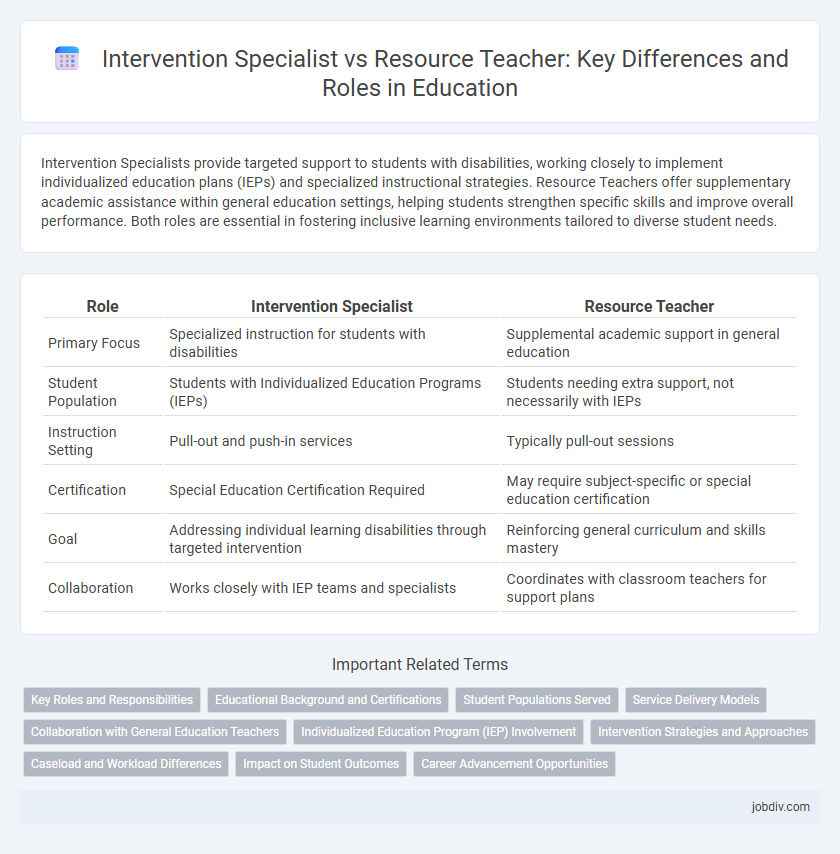Intervention Specialists provide targeted support to students with disabilities, working closely to implement individualized education plans (IEPs) and specialized instructional strategies. Resource Teachers offer supplementary academic assistance within general education settings, helping students strengthen specific skills and improve overall performance. Both roles are essential in fostering inclusive learning environments tailored to diverse student needs.
Table of Comparison
| Role | Intervention Specialist | Resource Teacher |
|---|---|---|
| Primary Focus | Specialized instruction for students with disabilities | Supplemental academic support in general education |
| Student Population | Students with Individualized Education Programs (IEPs) | Students needing extra support, not necessarily with IEPs |
| Instruction Setting | Pull-out and push-in services | Typically pull-out sessions |
| Certification | Special Education Certification Required | May require subject-specific or special education certification |
| Goal | Addressing individual learning disabilities through targeted intervention | Reinforcing general curriculum and skills mastery |
| Collaboration | Works closely with IEP teams and specialists | Coordinates with classroom teachers for support plans |
Key Roles and Responsibilities
Intervention Specialists primarily design and implement individualized education plans (IEPs) for students with disabilities, focusing on specialized instruction and behavioral interventions to support diverse learning needs. Resource Teachers collaborate with general education teachers to modify curriculum, provide targeted small-group instruction, and facilitate access to general education classrooms for students requiring academic assistance. Both roles emphasize fostering student achievement through tailored support and continuous progress monitoring within inclusive educational settings.
Educational Background and Certifications
Intervention Specialists typically hold a bachelor's degree in special education or a related field, often accompanied by state certification in special education, enabling them to design and implement individualized education programs (IEPs) for students with disabilities. Resource Teachers generally possess a bachelor's degree in education, with certifications in both general and special education, allowing them to provide targeted support in academic subjects within resource rooms or inclusive classrooms. Both roles require ongoing professional development and state-mandated credentials to maintain expertise in educational strategies and legal compliance.
Student Populations Served
Intervention Specialists primarily support students with identified disabilities, providing tailored instruction and individualized education plans (IEPs) to meet diverse learning needs within special education programs. Resource Teachers serve a broader range of students, including those with mild to moderate disabilities, offering targeted support within general education classrooms to enhance academic achievement and inclusion. Both roles collaborate to address varying student populations by delivering specialized strategies that promote educational access and success.
Service Delivery Models
Intervention Specialists provide specialized, individualized instruction within inclusive classrooms, focusing on tailored support for students with disabilities. Resource Teachers deliver targeted instruction in pull-out settings, supplementing general education by addressing specific skill deficits. Both service delivery models prioritize collaboration with general educators to enhance student outcomes through differentiated strategies.
Collaboration with General Education Teachers
Intervention Specialists collaborate closely with general education teachers to design and implement individualized instructional strategies that support students with diverse learning needs. Resource Teachers work alongside classroom teachers by providing targeted academic interventions and adapting curriculum to ensure inclusive learning environments. Both roles emphasize continuous communication and team planning to promote student success within general education settings.
Individualized Education Program (IEP) Involvement
Intervention Specialists and Resource Teachers both play crucial roles in supporting students with Individualized Education Programs (IEPs), with Intervention Specialists often leading the development and implementation of IEP goals tailored to students' unique learning needs. Resource Teachers primarily provide targeted academic support aligned with the IEP, ensuring students receive specialized instruction within or outside the general education classroom. Collaboration between these professionals enhances the effectiveness of IEP services, promoting student success through personalized strategies and consistent progress monitoring.
Intervention Strategies and Approaches
Intervention Specialists employ targeted, evidence-based strategies such as individualized behavior plans and multisensory instruction to address specific learning needs and disabilities. Resource Teachers focus on providing supplemental instruction and support within general education settings, using differentiated teaching methods and scaffolded learning to reinforce core skills. Both roles prioritize data-driven progress monitoring and collaboration with educators to optimize student outcomes.
Caseload and Workload Differences
Intervention Specialists typically manage smaller caseloads of students with specific disabilities, allowing for intensive, individualized instruction and collaboration with general education teachers. Resource Teachers handle larger caseloads, often providing targeted support to students who require moderate assistance, balancing direct instruction with progress monitoring across multiple classrooms. Differences in workload stem from the depth of intervention, with Intervention Specialists dedicating more time per student due to complex needs, while Resource Teachers spread their efforts across a broader student population.
Impact on Student Outcomes
Intervention Specialists provide targeted support for students with disabilities, enhancing individualized learning plans that improve academic and social-emotional outcomes. Resource Teachers offer supplemental instruction in general education settings, reinforcing core curriculum and boosting student achievement across diverse learner groups. Both roles collaboratively contribute to increased student engagement, higher test scores, and better overall educational success.
Career Advancement Opportunities
Intervention Specialists often access advanced career pathways by specializing in behavioral therapy, special education leadership, or obtaining certifications like the Certified Special Education Teacher (CSET). Resource Teachers can expand career opportunities by enhancing skills in curriculum adaptation, instructional technology, or transitioning into roles such as instructional coordinators or academic coaches. Both positions offer growth potential through professional development and advanced degrees, fostering expertise in meeting diverse student needs.
Intervention Specialist vs Resource Teacher Infographic

 jobdiv.com
jobdiv.com